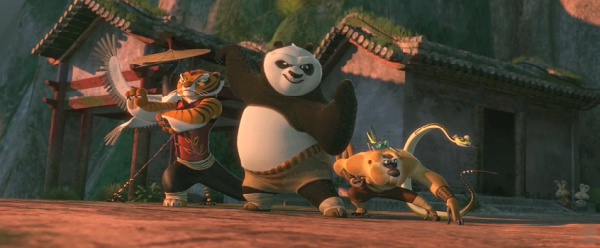2011 // USA // Rob Marshall // May 20, 2011 // 3D Digital Theatrical Projection (St. Louis Cinemas Moolah Theater)
We all have our guilty pleasures, and where the contemporary cinema is concerned, mine is without question the Pirates of the Caribbean film series. I defer to no one in my utterly indefensible affection for them. Of course, under a candid appraisal, the Pirates films are the embodiment of Hollywood's recent summer blockbusters: loud, garish, bloated things, weighed down by convoluted plotting and an elaborate, sketchily-conveyed mythology. They are, without a doubt, Bad Movies... and yet, there's something enthralling in the franchise's kitschy Disney heart.
Paradoxically, part of the thrill lies in that aforementioned mythology, the creation of series scribes Ted Elliot and Terry Rossio. If the Pirates films could be said to have auteurs, they would unquestionably be Elliot and Rossio, rather than directors Gore Verbinski or Rob Marshall. (One should also acknowledge Johnny Depp himself, who allegedly defied the studio in establishing Jack Sparrow as a swishy ne'er-do-well, a choice that has been thoroughly vindicated.) Elliot and Rossio amalgamate an unexpectedly deep appreciation for nautical and historical detail with a diverse array of familiar fantasy influences. The result is a playful and tremendously rich (and yet curiously unheralded) feat of cinematic world-building. Also crucial to the films' appeal are a crop of deliciously memorable and game performances, not only from Depp, but also from Geoffrey Rush, Kevin McNally, Bill Nighy, and many others.
Fortunately for viewers, the story arc of Will Turner (Orlando Bloom) and Elizabeth Swann (Keira Knightley) concluded with At World's End, permitting the series to jettison its dreary romantic leads. On Stranger Tides presents a new story mostly unconnected to the prior saga, with Depp, Rush, and McNally being the only significant faces to return. Perhaps "new" isn't entirely accurate, as the fourth film is based on Tim Powers' 1987 novel On Stranger Tides. Yes, 1987, as in "predating the film franchise by sixteen years." Therein lies a tale...
Powers' historical fantasy novel weaves together Blackbeard, voodoo, and the Fountain of Youth, but it had nothing to do with Disney's Pirates of the Caribbean theme park attraction. However, both the novel and the ride were key influences on video game designer Ron Gilbert when he created LucasArts' popular Monkey Island adventure game series in the 1990s. Monkey Island, in turn, is assumed to be a major and unacknowledged influence on the Pirates film franchise, due mainly to Elliot's work on a Monkey film adaptation that perished in Development Hell. Disney evidently acquired the right to Powers' novel long ago, and when the time came to churn out another Pirates film, Elliot and Rossio reworked On Stranger Tides into the mythology of Jack Sparrow's world. Accordingly, Pirates of the Caribbean: On Stranger Tides is something like the bastard progeny of a film series by way of its own grandfather.
Well, what of the new film? There's nothing fresh to lure in viewers who long ago washed their hands of Jack Sparrow, but there's plenty of the pulpy goodness that fans of the series expect from Elliot, Rossio, and Depp. Namely: cartoonish swashbuckling action, cunningly realized supernatural marvels, and a sense of humor that alternates between the groan-worthy and the deliriously offbeat. Happily, the writers seem to have learned a bit from the worst excesses of the past two films. The action sequences no longer go on and on to the point of monotony, and the plot is relatively straightforward compared to the tangle of double-crosses and triple-crosses that bedeviled the earlier entries. Blackbeard (Ian McShane) proves to be a menacing but thoroughly human villain, which is both a refreshing change of pace and a bit of a letdown following Nighy's stupendous, tentacled Lucifer, Davy Jones. Despite the love-hate sparks between Jack and Blackbeard's daughter, Angelica (Penelope Cruz), the series still insists on presenting a trite storybook romance between a couple of gorgeous white people. Instead of Bloom and Knightley, this time the chaste yearning is reserved for a sensitive missionary (Sam Claflin) and a distressed mermaid (Astrid Berges-Frisbey). It's pointless, but at least it's relegated to the background for this outing.
For hardcore devotees of the Pirates franchise, the most fascinating aspect of On Stranger Tides is the extent to which Jack Sparrow is actually evolving in his worldview and priorities. In this, and in an unfortunate number of plot details and gags, the writers seem to be drawing directly from the Indiana Jones films. Jack's personality is just as cheeky and craven as ever, but the subtext running through the new film (yes, subtext!) is Jack's emergent acceptance of mortality as a crucial component of his libertine values. Moreover, Jack's tribulations in the first three films--and myriad off-screen misadventures--seem to have soured him on the supernatural as a shortcut to wealth and power. These wrinkles undeniably enhance the potential of the planned fifth and sixth films, especially given Jack's predicament at the conclusion of On Stranger Tides. His unease with the confinements of the emerging eighteenth-century modernity raises the question that unabashed Pirates aficionados will have to confront: How will bonny Jack Sparrow finally meet his end?









